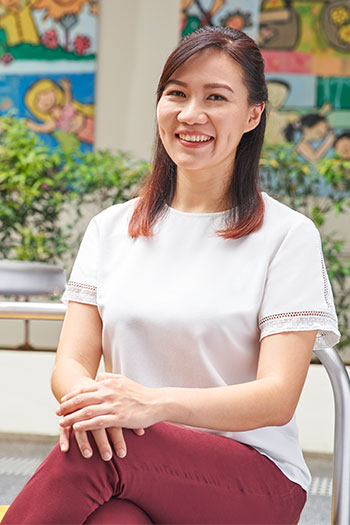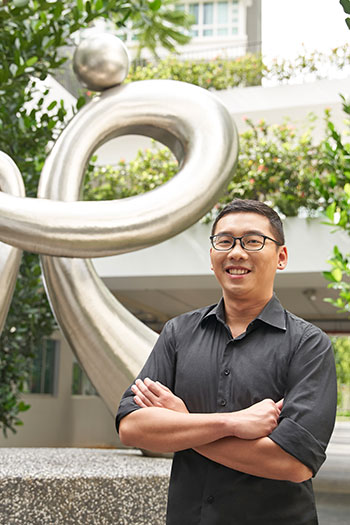Made up of over 450 social service organisations, the social service sector sees 13,000 professionals supporting individuals with life challenges day in and day out. Over the years, there have been misconceptions about what it takes to be a social service professional. Social Worker Chan Jian Hong and Speech-Language Therapist Evelyn Chen shed light on their roles, myths, the challenges they face and how they overcome them.
What sparked your interest in social service?
Evelyn: While in university, I volunteered with adults with varying disabilities. I realised how their communication difficulties affected their relationships with others and consequently, their quality of life. I became inspired to help people communicate better and working in social service offers me the best opportunity to do so.
Jian Hong: My mother, who is one of the important figures in my life, sparked my interest in social service when she brought me to different talks. I attended a talk on benefitting society and the rest was history.

Evelyn Chen
Social Service Scholar
Speech-Language Therapist
Why did you choose your specialisation? What are your roles and responsibilities?
Evelyn: Communication is a crucial aspect of our lives that we often take for granted. I realised how frustrating it can be for children facing communication difficulties to understand their world and express themselves. I saw meaning in being the bridge of communication for them. I am a Speech-Language Therapist at a social service organisation where I assess communicative difficulties and provide therapy based on individual needs.
Jian Hong: I am a Social Worker at a family service centre where we help build strong and stable families in Singapore. We harness community resources to help individuals and families better support and empower one another. We also provide support to address personal, social and emotional challenges of individuals and families.
What are some challenges you face at work? How do you overcome them?
Evelyn: My main challenge is getting various stakeholders involved. Most people may see therapy as the sole responsibility of the therapist, but it is most effective when stakeholders, such as parents and teachers, also work on common goals for the child. I often share with stakeholders the importance of a collaborative and supportive working relationship, and keep in regular contact with them throughout the therapy process.
Jian Hong: I recall a project at a HDB block. I organised a potluck party and visited the residents regularly prior to that. However, one week before the programme, there were no replies from the residents. My colleagues encouraged me by saying that it was not a failure and that we need to focus on the next step, which was coming up with a contingency plan. We came up with one and held the event successfully. This enforced my belief that a workplace with kindred spirits and teamwork helps to overcome any challenges I may face at work.
What are some memorable experiences in your career?
Evelyn: I worked with a client with autism whose mother needed support in understanding her child’s challenging behaviourial traits. I helped her to realise that her child was probably demonstrating these traits to communicate a need or frustration, and not because of bad behaviour. After sharing with her on how to communicate with her child at a level that he understood better, she was able to connect with her child better and saw an improvement in the way he expressed himself.
Jian Hong: One memorable case was a mother-youth pair who came to the family service centre to seek help for the teenager’s anger management issue. We worked on how the teen can respond differently when he’s angry and how the mother can provide support by handling matters appropriately. After a few months, the mother enquired about paying for the counselling services. However, I told her that the centre provides services at no cost. Upon hearing that, she donated to our centre instead. I realised that when you do something without asking for anything in return, the people who benefitted are often very grateful and want to pay it forward as well.

Chan Jian Hong
Social Service Scholar
Social Worker
What is one myth that you would like to dispel about the social service profession?
Evelyn: The perception is that the social service sector is an unexciting one with limited opportunities for development. On the contrary, it is growing at a fast pace, with attractive remuneration, and opportunities for career development. As more attention is placed on the sector, and as it gears up to serve the increasing needs of our society, we can only look forward to exciting times ahead.
Jian Hong: Social service professionals do not work with just the poor. That was how social work may have started, but as our society progressed, social service has expanded to support people facing mental health challenges, social isolation and other issues. We strive to provide a good ecosystem of mutual help that benefits diverse individuals.
How has the social service scholarship benefitted you?
Evelyn: The social service scholarship allowed me to pursue my master’s in speech-language therapy overseas. This broadened my exposure to how speech-language therapy is practised internationally. With a diversified pool of knowledge and skills acquired, I can contribute more back here in Singapore. The scholarship also provides rotation opportunities to different agencies every two years. Through this, I gain a variety of clinical experiences with different agencies and client demographics which gives me a macro perspective of various therapy models and organisational structures.
Jian Hong: NCSS provides mentoring, and invites us to dialogues with policymakers and special networking sessions, so that we can develop holistically. Through these, I get to meet many other passionate social service professionals who continuously inspire me to forge ahead on this arduous but rewarding journey to serve the community.
What advice would you give to those considering a scholarship with NCSS?
Evelyn: A social service scholar should have the heart to serve. With the passion to serve your clients, you will continuously strive to do your best for them even during difficult times. Having an openness to learn is another crucial quality that would improve your skills as a clinician and improve your service.
Jian Hong: My advice is to think about the extent that you are willing to give to the community. From my professional experience, I feel that the more I give, the more joy I receive.

